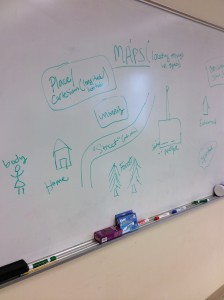Dr. Elizabeth Olson of the University of North Carolina has been approved for a $14,839 award by the Patient-Centered Outcomes Research Institute (PCORI) to support a project titled Building Networks for Comparative Research with Youth Caregivers and Older Adults.
Dr. Olson will use the funds provided through PCORI’s Pipeline to Proposal Awards program to build a partnership of individuals and groups who share a desire to advance patient-centered outcomes research focused on the wellbeing of youth caregivers and the older adults they live with or care for. She will be directing the development of the program along with Mr. Martin Hunicutt, advisory board member of the American Association of Caregiving Youth.
Pipeline to Proposal Awards enable individuals and groups that are not typically involved in clinical research to develop the means to develop community-led funding proposals focused on patient-centered comparative effectiveness research (CER). Established by the non-profit PCORI, the program funds three tiers of awards that help individuals or groups build community partnerships, develop research capacity, and hone a comparative effectiveness research question that could become the basis of a research funding proposal to submit to PCORI or other health research funders.
Youth caregivers, a typically unrecognized and vulnerable population, provide care and assistance to ill, disabled, or aging individuals. In 2005, there were 1.3-1.4 million youth caregivers in the United States, and over one-third of these were caring for grandparents or great-grandparents. Despite their importance in contemporary family caregiving, caregivers under age 18 are excluded from federal and state programs that have been designed to both support caregivers and improve the care of aging adults. This project, therefore, seeks to understand the issues facing youth caregivers and the older adults they care for by discussing their priorities for enhancing well-being in intergenerational caregiving households.
Over the course of nine months, Dr. Olson and Mr. Hunicutt will establish a patient-centered infrastructure of networks and resources in the Triangle region of North Carolina in collaboration with the Triangle J Area Agency on Aging, the American Association of Caregiving Youth, and other local community groups and service providers. Activities will include meeting with aging adults and their families to identify the modes of caregiving support that they rely on for stabilizing and improving youth caregiving outcomes; establishing a national stakeholder’s advisory group; and creating sustainable approaches to involving patients and caregivers through digital platforms and age-appropriate intergenerational organizing. The Tier I Pipeline to Proposal activities will allow the network to identify research questions that are better reflections of the needs of caregiving youth and their older adult patients.
“The Pipeline to Proposal Awards program is a manifestation of PCORI’s commitment to the meaningful involvement of patients, caregivers, clinicians, and other stakeholders in all our research endeavors,” said Jean Slutsky, PA, MSPH, PCORI’s Chief Engagement and Dissemination Officer. “It provides support to those who may not otherwise have an opportunity to contribute to the field of comparative effectiveness research. We’re pleased to follow the awardees’ progress as they develop partnerships and begin to form research questions.”
PCORI is an independent, non-profit organization authorized by Congress in 2010 to fund comparative effectiveness research that will provide patients, their caregivers, and clinicians with the evidence needed to make better-informed health and healthcare decisions. PCORI is committed to seeking input from a broad range of stakeholders to guide its work.
